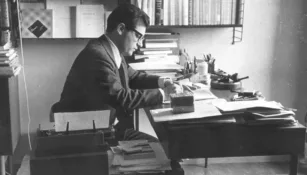CONTRIBUTI / 5 / Sofia Beatriz Calvente
In the early modern period the chain of being thesis was used by naturalists and philosophers to justify female subordination. My aim is to establish whether Catharine Trotter Cockburn’s endorsement of this thesis entails that differences between sexes assigns differentiating places in the scale or not. I will review Locke’s formulation of the ontological scale first, because Cockburn refers to his description. Locke’s skepticism regarding our access to the real essence of substances hinders him from drawing unequivocal boundaries between species and even within human species. However, he states that wives must subordinate to husbands on the basis of a higher capacity and strength naturally endowed to men. Cockburn’s understanding of the ontological scale rests on a realist conception where boundaries between species are clearly delimited because their nature is fixed and immutable. This insight into the ontological scale is employed to endorse natural equality between sexes, because if all members of a species share the same nature, they deserve equal treatment. Cockburn explains women subjection in terms of vicious notions and attitudes rooted in prejudice.
References
Primary sources
- Addison, J. 1712. The Spectator No. 519. https://www.gutenberg.org/files/12030/12030-h/SV3/Spectator3.html#section519
- Clarke, S. 1788. The Works of Samuel Clarke, vol. II, London, J. and P. Knapton.
- Cockburn, C. 1751. The Works of Mrs Catharine Cockburn, 2 vols., ed. by Th. Birch, London, J. and P. Knapton.
- Cockburn, C. 2006. Philosophical Writings, ed. by P. Sheridan, Peterborough, Broadview Press.
- Locke, J. 1975. An Essay Concerning Human Understanding, ed. by P. H. Nidditch, Oxford, Clarendon Press.
- Locke, J. 1988. Two Treatises of Government, ed. by P. Lasslet, Cambridge, Cambridge University Press.
- Malebranche, N. 1997. The Search after Truth, trans. and ed. by Th. Lennon and P. Olscamp, Cambridge, Cambridge University Press.
Secondary literature
- Anstey, P. 2011. John Locke and Natural Philosophy, Oxford, Oxford University Press.
- Apetrei, S. 2010. Women, Feminism and Religion in Early Enlightenment England, Cambridge, Cambridge University Press.
- Atherton, M. 2007. Locke on Essences and Classification, in L. Newman (ed.), The Cambridge Companion to Locke’s Essay concerning Human Understanding, Cambridge, Cambridge University Press.
- Boeker, R. 2023. Catharine Trotter Cockburn, Cambridge, Cambridge University Press.
- Brandt Bolton, M. 1993. Some Aspects of the Philosophical Work of Catharine Trotter, «Journal of the History of Philosophy», 31 (4), pp. 565-588.
- Brennan, T. and Pateman, C. 1979. ‘Mere Auxiliaries to the Commonwealth’: Women and the Origin of Liberalism, «Political Studies», 27 (2), pp. 183-200.
- Broad, J. 2003. Women Philosophers of the Seventeenth Century, Cambridge, Cambridge University Press.
- Broad, J. 2020. Women Philosophers of Eighteenth-Century England. Selected Correspondence, Oxford, Oxford University Press.
- Calvente, S. 2023. Un problema metafísico en la filosofía de Catharine Trotter Cockburn: el espacio, el alma y la jerarquía de seres, «Thémata. Revista de filosofía», 67, pp. 139-161.
- De Tommaso, E. 2016. Damaris Masham and Catharine Trotter on the Naturally Rational and Social Identity of Human Beings, «The Proceedings Book Philhist’16/III», International Multitrack Conference on History of Philosophy, Istanbul.
- De Tommaso, E. 2024. Il luogo dei corpi e degli spiriti. Cockburn in dialogo con Clarke, Law e Watts sull’ontologia dello spazio, in D. Giovannozzi and E. De Tommaso (eds.), Donne, filosofia della natura e scienza, Roma, ILIESI Digitale (Ricerche), 2024, pp.174-196.
- Di Biase, G. 2020. John Locke on Women’s rationality, «Philosophical Inquiry», 8 (2), pp. 9-30.
- Grant, R. 2003. John Locke on Women and the Family, in J. Locke. Two Treatises of Government and A Letter concerning Toleration, ed. by I. Shapiro, New Haven, Yale University Press.
- Green, K. 2014. A History of Women’s Political Thought in Europe, 1700-1800, Cambridge, Cambridge University Press.
- Green, K. 2021. The Rights of Women and the Equal Rights of Men, «Political Theory», 49 (3), pp. 403-430.
- Hirschmann, N. and McClure, K. 2007. Introduction, in N. Hirschmann and McClure, K. (eds.), Feminist Interpretations of John Locke, Pennsylvania, Pennsylvania University Press.
- Kelley, A. 2001. “In Search of Truths Sublime”. Reason and the Body in the Writings of Catharine Trotter, «Women’s Writings», 8 (2), pp. 235-250.
- Kuklok, A. 2022. Locke on Essences, in J. Gordon-Roth and Shelley Weinberg (eds.), The Lockean Mind, Oxford, Routledge.
- Lovejoy, A. 1936. The Great Chain of Being. A Study of the History of an Idea, Cambridge, Harvard University Press.
- Nuovo, V. 2011. Christianity, Antiquity and Enlightenment. Interpretations of Locke, Dordrecht, Springer.
- Ready, K. 2002. Damaris Cudworth Masham, Catharine Trotter Cockburn, and the Feminist Legacy of Locke’s Theory of Personal Identity, «Eighteenth-Century Studies», 35 (4), pp. 536-576.
- Sample, R. 2000. Locke on Political Authority and Conjugal Authority, «Locke Newsletter», 31, pp. 115-146.
- Schiebinger, L. 2013. Nature’s Body. Gender in the Making of Modern Science, New Brunswick, Rutgers University Press.
- Sheridan, P. 2007. Reflection, Nature, and Moral Law: The Extent of Catharine Cockburn’s Lockeanism in Her Defence of Mr. Locke’s Essay, «Hypatia», 22 (3), pp. 133-151.
- Sheridan, P. 2018. On Catharine Trotter Cockburn’s Metaphysics of Morals, in E. Thomas (ed), Early Modern Women on Metaphysics, Cambridge, Cambridge University Press.
- Sheridan, P. 2022. Locke and Catharine Trotter Cockburn, in J. Gordon-Roth and S. Weinberg (eds.), The Lockean Mind, Oxford, Routledge.
- Stuart, M. 1999. Locke on Natural Kinds, «History of Philosophy Quarterly», 16 (3), pp. 277-296.
- Thomas, E. 2015. Catharine Trotter Cockburn on Unthinking Immaterial Substance: Souls, Space and Related Matters, «Philosophy Compass», 10, pp. 255-263.
- Tuana, N. 1993. The Less Noble Sex. Scientific, Religious and Philosophical Conceptions of Woman’s Nature, Bloomington, Indiana University Press.
- Winkler, K. 2016. Locke on Essence and the Social Construction of Kinds, in M. Stuart (ed.), A Companion to Locke, Malden, Blackwell.

